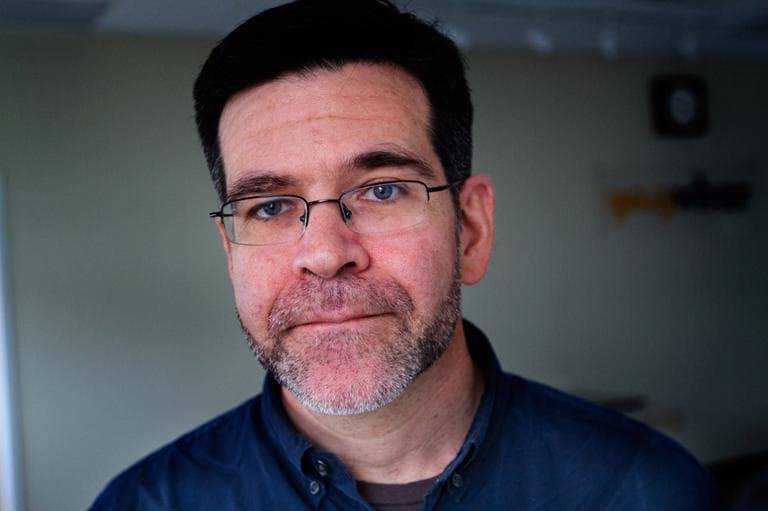Advertisement
Has The Media Failed In Covering Climate Change?
Resume
Wen Stephenson used to be an editor at The Atlantic and The Boston Globe, and has worked on NPR and PBS programs. He considered himself well-informed and engaged.
But after leaving as senior producer of NPR's On Point two and a half years ago, Stephenson threw himself into an intense study of the effects of global warming.
The experience changed him, and Stephenson felt compelled to share what he'd learned. Knowing that it might bar him from ever working for a mainstream media company again, Stephenson decided that he had to become a climate activist.
Now Stephenson is back with a message for his former journalism colleagues: You are failing.
In a recent front-page story for The Boston Phoenix, Stephenson argued that journalists' business-as-usual approach to global warming is missing the mark.
Climate change is one of the biggest stories of our lives, he wrote, and it should be getting front-page crisis coverage.
Here are two excerpts from that essay:
Dear friends and colleagues:
This is hard. Coming to grips with the climate crisis is hard. It's frightening. It's infuriating. It's heartbreaking.
Likewise, what I have to say here is hard. But it's honest, and it's necessary. And it's for real.
Our most respected climate scientists, people like NASA's James Hansen and MIT's Kerry Emanuel, as well as global energy experts such as Fatih Birol, chief economist of the International Energy Agency — people who, it's fair to say, may not always agree on politics and policy — are increasingly clear and vocal about one thing: we're rapidly running out of time to address climate change in any meaningful way and avoid the risk of global climate catastrophe, with the incalculable human suffering that it will bring, quite possibly in this century.
In the face of this situation — as much as it pains me to say this — you are failing. Your so-called "objectivity," your bloodless impartiality, are nothing but a convenient excuse for what amounts to an inexcusable failure to tell the most urgent truth we've ever faced.
What's needed now is crisis-level coverage. And you guys know how to cover a crisis. In the weeks and months — nay, years — following 9/11, all sorts of stories made the front pages and homepages and newscasts that never would have been assigned otherwise. The same was true before and after the Iraq invasion, and in the months following the 2008 financial meltdown. In a crisis, the criteria for top news is markedly altered, as long as a story sheds light on the crisis topic. In crisis coverage, there's an assumption that readers want and deserve to know as much as possible. In crisis coverage, you "flood the zone." You shift resources. You make hard choices.
The climate crisis is the biggest story of this, or any, generation — so why the hell aren't you flooding the climate "zone," putting it on the front pages and leading newscasts with it every day? Or even once a week? Why aren't you looking constantly at how the implications of climate change and its impact pervade almost any topic — not just environment and energy stories?
- The Phoenix: A Convenient Excuse by Wen Stephenson
The Atlantic's James Fallows responded to his former colleague's assertions on the same day Stephenson's article was printed.
"It is not comfortable to read," Fallows wrote. "But I am glad he wrote it."
Peter Canellos, editorial page editor of the Globe, provided this statement to Here & Now:
The Globe’s editorial board routinely meets with activists on all sides of major issues. These visitors come to the meetings with the understanding that the board’s role is to probe their views closely, often asking uncomfortable or “devil’s advocate”-type questions. As Wen Stephenson pointed out in his piece in the Boston Phoenix, the Globe has been a steady advocate for programs to fight climate change, from raising fuel-efficiency standards to imposing a “cap-and-trade” program on polluters to reducing the level of emissions allowable under the regional Greenhouse Gas compact. We were strong and early supporters of the Cape Wind project. We also have advocated repeatedly for clean-energy grants and loans. When the heavily subsidized Evergreen Solar went bankrupt, we argued that the state’s potential gain from the investment had been worth the risk. Obviously, there are some people who would take more radical steps to limit greenhouse-gas emissions. I like and respect Wen Stephenson, and honor his commitment to the very important issue of global warming. But his piece in The Phoenix makes a basic error in equating the questions we asked him at a meeting with our underlying positions. It’s hardly irresponsible or myopic to ask about the cost to the economy of cancelling major pipelines and imposing stiff new regulations, even if we go on to support such moves. It’s part of the reporting process. The Globe’s editorial board is committed to probing all sides of major issues, and asking critical questions of the advocates who seek our support. Our readers expect nothing less.
Do you think the media has failed in covering climate change? You can let us know in the comments or on Facebook.
Guest:
- Wen Stephenson, climate activist and former editor at the Atlantic and the Boston Globe. He tweets @wenstephenson.
This segment aired on November 15, 2012.